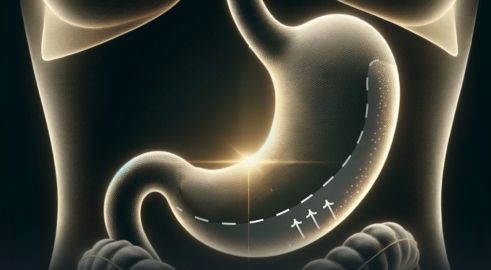Understanding How Endoscopic Sleeve Gastroplasty (ESG) Facilitates Weight Loss
Discover the science behind Endoscopic Sleeve Gastroplasty (ESG), a minimally invasive weight loss procedure. Learn about its advantages and benefits.

Bariendo Team
Team @ Bariendo
Obesity can lead to a host of issues for your health and well-being. With millions of Americans dealing with obesity, the need for effective, minimally invasive, and long-lasting solutions becomes more paramount than ever before. Before exploring surgical solutions with risks and extensive downtime, patients may appreciate the benefits of procedures such as Endoscopic Sleeve Gastroplasty (ESG).
Learn the science behind ESG, its advantages, and how this groundbreaking procedure is facilitating life-changing weight loss for individuals. Knowing your weight-loss options, you can discuss with your doctor the best solutions to improve your quality of life and overall well-being.
What Is Endoscopic Sleeve Gastroplasty?
Endoscopic sleeve gastroplasty (ESG) is a minimally invasive, non-surgical procedure where the stomach’s volume is significantly reduced through sutures. By reducing their stomach size, patients can feel full more quickly and longer, assisting with their weight loss goals.
During an ESG endoscopic sleeve gastroplasty, your doctor will insert an endoscope through your mouth and guide it toward your stomach. The suturing device will create a sleeve-like structure, ultimately reducing your stomach size by up to 75%. The entire outpatient procedure takes about an hour.
The results of ESG have helped many patients through cognitive restraint, emotional eating, and uncontrolled eating. With nutritional guidance, regular exercise, and commitment to a healthier lifestyle, patients lose an average of 18% of their body weight.
Benefits of ESG
Patients who undergo an ESG weight loss procedure can notice an improvement in their weight loss journey. This procedure offers several benefits for eligible patients, including:
- Appetite Control: ESG effectively achieves significant weight loss for patients with obesity. It helps control portions by reducing the stomach size and creating a feeling of fullness sooner.
- Avoid Risks of Surgical Procedures: As a less invasive procedure than traditional bariatric surgery, ESG has a lower risk of complications such as infection, bleeding, scarring, and anesthetic complications.
- Faster Recovery: ESG is an outpatient procedure, so patients can go home after the procedure. Patients take a few days off work and return to their routine within a week. In comparison, surgical procedures like bariatric surgery often require up to a month of downtime.
- Long-Term Effects: Many patients have seen the effects of their ESG procedures lasting five years or longer. Five years after ESG, most patients report a 16% reduction from their pre-ESG weight.
Do I Qualify for ESG?
Those interested in undergoing ESG must schedule an initial consultation with a medical specialist. They can recommend ESG for patients who:
-
Have a body mass index (BMI) of 30 or higher
-
Have a BMI of 27 and have chronic conditions such as diabetes, fatty liver disease, high blood pressure, high cholesterol, and sleep apnea
-
Have previously struggled with weight loss programs, dieting, and exercise
-
Are interested in less invasive solutions compared to bariatric surgery
-
Are committed to living a healthier lifestyle long-term
During your consultation, your doctor may request laboratory tests and imaging to ensure you’re suitable for the procedure. Patients with stomach ulcers and bleeding disorders may not qualify for ESG.
How Much Weight Can I Expect To Lose?
Weight loss can depend on many factors, so your ESG procedure results can vary from other patients. On average, patients can lose 18% of their body weight within the first year, though results can range from 15 to 20%. Some patients may experience more than 25% body weight loss.
Some factors that can affect your weight loss journey include:
- Lifestyle Modifications: ESG patients must commit to a long-term healthy lifestyle to maximize the effects the procedure can have on their stomachs. This includes how active you are, the food you eat, your sleeping habits, and your daily routine.
- Medication: Some chronic conditions may require medication that can contribute to weight gain. For example, patients with allergies may take antihistamines, which are linked to weight gain.
- Chronic Conditions: Endocrine diseases, stress, and eating disorders are linked to weight gain. Patients may require additional medical intervention to manage these effects on their weight loss goals.
- Genetics: If one or both of your parents have obesity, the chance of developing obesity is more likely. Your genes can determine the amount of fat you store, your appetite, and your drive for physical activity.
Build Your Best Self With Bariendo’s Non-Surgical Weight Loss Solutions
ESG offers promising solutions for those struggling with obesity seeking a safe and effective weight loss solution. It provides a lower-risk alternative and offers plenty of benefits over traditional bariatric surgery. Ultimately, ESG can transform lives by helping individuals overcome their weight loss journey and enjoy an improved quality of life.
At Bariendo, we offer weight loss that lasts. Our team consists of world-class doctors spearheaded by the pioneer of ESG, so we have a comprehensive understanding of the procedure and how it can help you achieve your weight loss goals. Request a free consultation today to see if you’re a suitable candidate for ESG.

